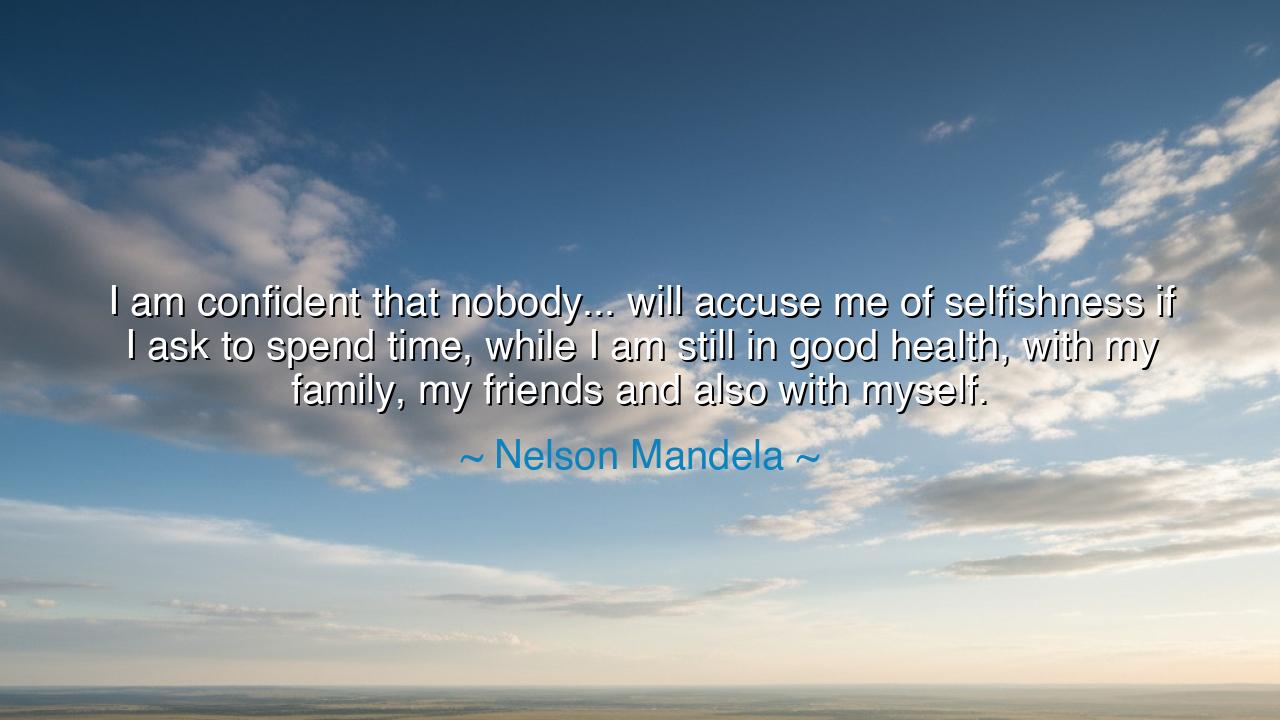
I am confident that nobody... will accuse me of selfishness if I
I am confident that nobody... will accuse me of selfishness if I ask to spend time, while I am still in good health, with my family, my friends and also with myself.






The words of Nelson Mandela—“I am confident that nobody… will accuse me of selfishness if I ask to spend time, while I am still in good health, with my family, my friends and also with myself.”—resonate as a profound meditation on the balance between duty and personal care. Mandela, a man whose life was devoted to the liberation of his people, speaks here with gentle authority: even the most selfless life must honor the sacred bonds of family, friendship, and self-reflection. He reminds us that devotion to others does not negate devotion to oneself, and that taking time to nurture the soul and relationships is an essential aspect of human dignity.
In these words, there is a recognition of the finite nature of life. Mandela, having endured decades of imprisonment and sacrifice, understood intimately the fragility of health and the fleeting moments in which joy can be fully experienced. To spend time with loved ones while still strong and capable is not selfish; it is prudent, wise, and humane. The ancients would have nodded in agreement, for philosophers from Aristotle to Confucius emphasized that life must be lived with balance—between service, pleasure, and contemplation—so that the individual may flourish while also serving the greater good.
The origin of this quote lies in Mandela’s later reflections, after decades of struggle, leadership, and sacrifice. Freed from the chains of imprisonment and political oppression, he sought not only to rebuild a nation but also to reclaim the intimate, personal joys of life. His words reveal a man who understood that love, laughter, and quiet reflection are as vital to the soul as any victory or public achievement. By valuing time with family, friends, and oneself, Mandela elevates the ordinary acts of human connection to the level of moral and existential necessity.
History provides vivid examples of this principle in action. Consider Marcus Aurelius, the Roman emperor and Stoic philosopher, who, despite commanding vast armies and governing an empire, often retreated into reflection and the company of family. His meditations reveal a man who understood that leadership and duty must be tempered with attention to one’s own inner life. Like Mandela, Aurelius recognized that strength of character and clarity of mind arise not only from action in the world, but from moments of connection, introspection, and presence with those who matter.
Mandela’s reflection also illuminates the idea that self-care is inseparable from service to others. A person who is drained, disconnected, or lonely cannot fully give to the world. By nurturing the self and the relationships closest to him, Mandela ensures that his capacity for compassion, leadership, and wisdom remains undiminished. This echoes the wisdom of the ancients: the good ruler, the wise leader, and the virtuous person must attend to the health of the soul, mind, and body in order to act justly and generously in public life.
The lesson embedded in his words is timeless: even the most dedicated and altruistic life requires personal space, attention, and care. Time spent with loved ones or in reflection is not indulgence, but preparation—it strengthens bonds, renews the spirit, and allows one to face the world’s challenges with clarity and vigor. Mandela teaches that honoring the self and one’s closest companions is an ethical act, a recognition that the human heart and mind cannot thrive without nourishment, rest, and intimacy.
Practically, this wisdom invites us to live consciously. Schedule moments for family, friends, and personal reflection. Celebrate life while the body and mind are strong. The ancients taught that balance between labor and leisure, between public duty and private joy, is essential for a fulfilled life. Mandela’s words remind us that even in the pursuit of noble causes, one must not neglect the smaller, intimate acts of love and care that sustain the human spirit.
And so, my children, remember this eternal guidance: to give to the world is noble, but to nurture yourself and your relationships is sacred. Spend time with those you love, honor your own well-being, and cherish the moments of quiet reflection. In doing so, you honor the full measure of life, cultivating strength, compassion, and wisdom, just as Nelson Mandela did—a life lived in the service of others, yet never at the expense of the soul.






AAdministratorAdministrator
Welcome, honored guests. Please leave a comment, we will respond soon